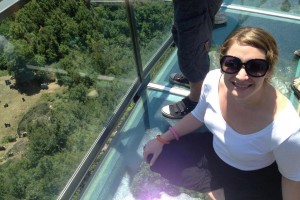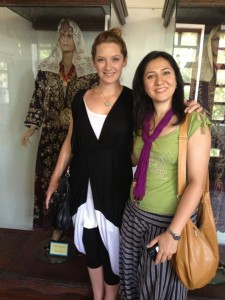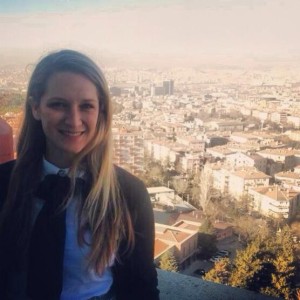Guest blogger Darci Pauser is a dual degree MPA/MAIR student and is spending her second year in Ankara, Turkey thanks to the David L. Boren Fellowship. I thought Darci’s experience is an excellent example of one of the program’s best attributes, flexibility.
By Darci Pauser, MPA/MAIR ‘14
As a prospective student of Maxwell’s PAIA Department, you will have many opportunities at your fingertips. One of these opportunities, the National Security Education Program’s (NSEP) David L. Boren Fellowship, funds up to one year of intensive critical language study in preparation for a career in the federal government. I was honored to have received this fellowship and would like to share my knowledge of the application process as well as my experience as a fellow.
Prior to coming to Maxwell, I knew that I wanted to pursue a career in the U.S. Foreign Service. I initially applied to the MAIR program but petitioned after admission for consideration in the dual MPA/IR. I highly recommend the dual program for those seeking to add breadth to their skills and academic experience, particularly the addition of budgeting and economic analysis. These skills aided my Boren application because I had a stronger foundational knowledge of environmental economics with which to study the ramifications of multilateral environmental agreements.
The Boren Fellowship is first and foremost program for study of a critical language. Including the Arabic dialects, there are over 70 languages deemed critical by the U.S. Department of State. However, in addition to language study, you must propose a research project which relates to national security, broadly writ. For example, although it is not often the first thing that comes to mind when discussing national security, my proposed project focused on environmental security issues—specifically, water rights between Turkey and neighboring Syria and Iraq.
With recent events in Syria as well as Turkey, engaging in fieldwork on this issue became less plausible. Moreover, interest in Turkey’s dam projects has all but come to a halt. Because of this, I ended up researching Turkey’s accession process into the EU and adoption of the Environmental Chapter. This is a case in point that you should expect your work on the ground to be at least somewhat different from your proposal. Another piece of advice I would like to give prospective students is to write as if you already have the fellowship (discussing what you will do, not what you wish to do or hope to do), but at the same time, realize that the proposal is a best-case scenario. It is your fantasy version of what you will accomplish.

For the Boren, make the connection of your past experiences, your future goals, the target language and national security very clear. Make a case not only for yourself, but also for your country of study. This will show the review committee that you have a grasp of how your host country affects the global stage in general and the U.S. in particular. Moreover, the Boren does not allot a certain number of fellowships for any one country. You need to be able to express to the committee why they should fund more fellows (i.e., you) in your specific country of study. Include as much detail as possible about the number of hours you will be involved in language study, where you will take any academic courses and with whom. Although a letter of sponsorship is not officially required, consider it required for all intents and purposes.
Make as many connections as you can prior to submitting your application. Be creative. You may gain valuable connections through citizens of the host country living right here in Syracuse. Research academic conferences and events you would like to attend in your country of study. Research NGOs, international organizations, non-profits and government organizations. However, keep in mind that the Boren absolutely does not allow any internships with a U.S. government organization while in the program. I almost missed this tidbit of information hidden in the FAQs of the Boren website. With that in mind, read the website in and out and attend as many of the podcasts as humanly possible.
While in Ankara, Turkey, I have attended nearly all Turkish courses offered by the TOMER language institute, interned at a Turkish think tank, published work in Turkish journals, interviewed public servants in Turkish ministries and presented research at a global conference. I look forward to visiting other international organizations relevant to my work in Paris, Brussels and The Hague in April. Although technically prohibited under the Boren, you may be able to receive permission to travel outside of the host country if your travel is directly connected to your project. I would not recommend including this in your application unless it is an integral part of your project.
The Boren extended my program of study at Maxwell by 8 months (from graduation in May 2014 to graduation in December 2014), even though my Boren and Critical Language Scholarship (CLS) programs lasted a total of 12 months. This is because I was able to complete the global internship requirement of the MAIR during the Boren. For those eager to start their exciting careers, it may be difficult to imagine that you will need to extend your graduation date. However, the Boren is an experience that you will carry with you for a lifetime. I also highly recommend applying for both the CLS and the Boren. The former is much more structured and guided than the latter, so I was able to get grounded here in Ankara logistically, interpersonally and linguistically before the Boren even began.
For those prospective students who have an interest in working for the Foreign Service, I would also recommend the Pickering and Rangel Fellowships. You must apply to these fellowships around the same time you apply to your graduate programs. Both fellowships fund your graduate studies and, in return, require you to work in the Foreign Service. Although I was not awarded either of these fellowships, I enjoyed the ability to get to know two other students at Maxwell who were awardees. They graciously shared their resources, experience and knowledge of the Foreign Service hiring process. In this way, the strength of the Maxwell community can be considered the greatest endowment of all.

